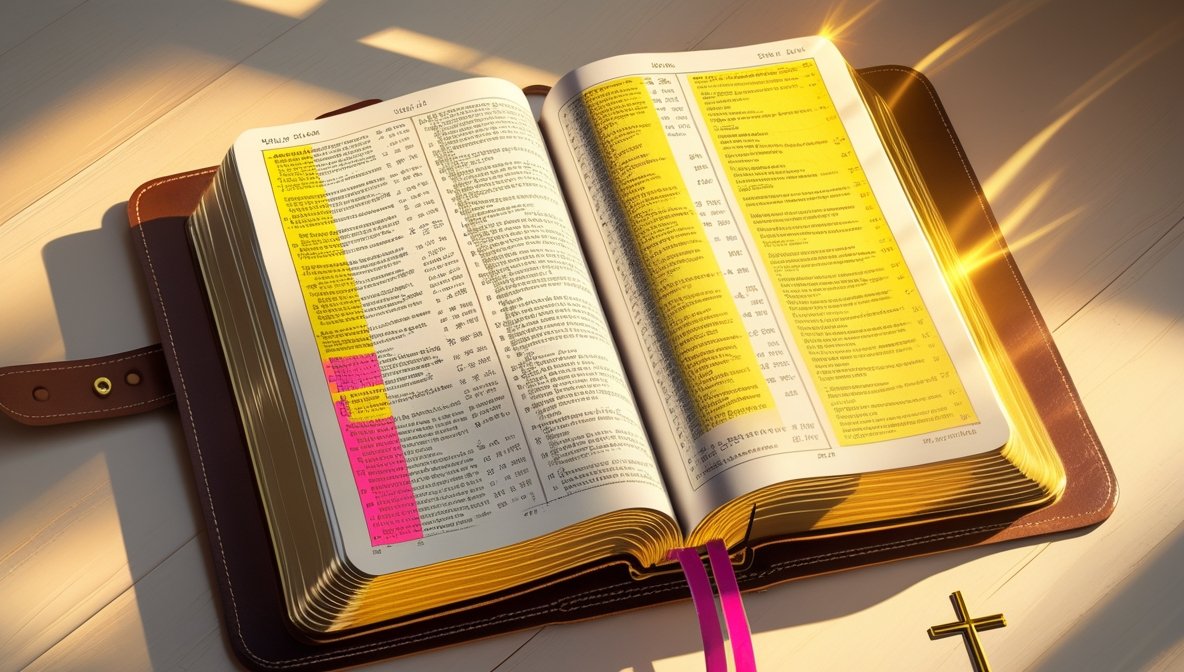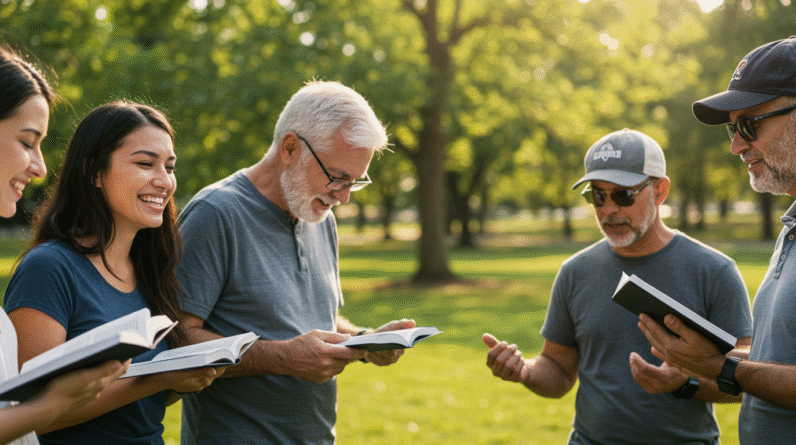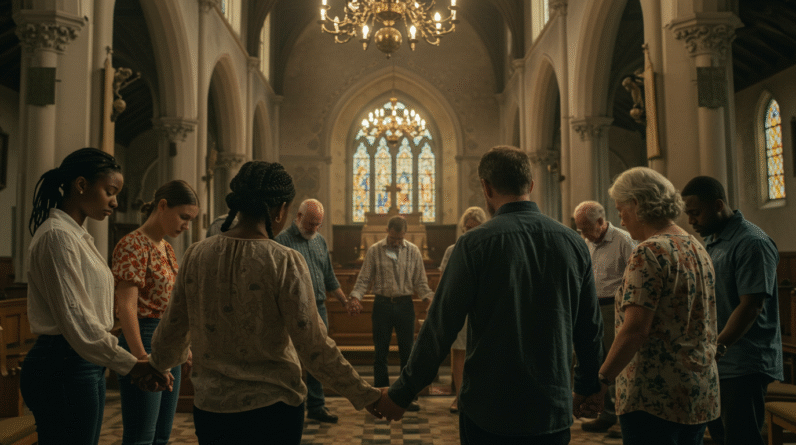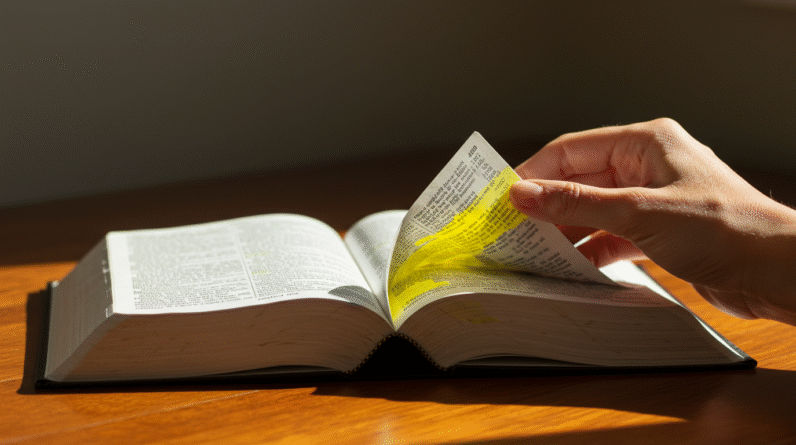The Importance Of Reading The Bible Daily After Salvation
You’ve just been through something that changes the coordinates of your life, an event that rearranges what you pay attention to and how you name things. Salvation isn’t a one-time emotional climax that disappears the moment coffee cools; it’s a reorientation. You find yourself in a life that now needs a map, a rhythm, and a language that makes sense of old habits and new commands. The Bible becomes that map, and the exercise of reading it every day is how you learn to navigate. If you’ve been wondering what it means to live after that pivotal “yes,” this is an attempt to be plain about the necessity and tenderness of reading the Bible daily after salvation: why it matters, how it reshapes you, and how you make it real without performing your faith into exhaustion.
Why Commit to Reading the Bible Daily After Salvation
When the shock of newness fades, the questions accumulate. You’ll want to know what this life looks like practically — how you speak, what you love, how you treat your body and your neighbor. Daily exposure to Scripture gives you repeated contact with God’s voice. Habit matters here; you’re rewiring attention. It’s like learning a language. If you live in a place where a language is spoken, daily practice makes your ear attuned to cadence and phrase and the things people actually mean when they say them. Similarly, daily reading trains you to hear the vocabulary of faith, the metaphors God keeps using.
The Bible is not merely a book of ideas. It’s a living means of formation. When you read it repeatedly, it not only informs your mind but slowly forms your desires. You’ll catch yourself thinking differently — less in the metrics of the world and more in the terms the Scriptures use. A good anchor verse for this is Romans 12:2: “Do not conform to the pattern of this world, but be transformed by the renewing of your mind.” The point isn’t to keep moral rules as a checklist but to change what you love and long for. Practicing reading the Bible daily after salvation gives the renewal described there a context and a course.
The Bible as Your Guidebook for Life
You’ll find that the Bible functions like a guidebook in practical, everyday ways. It isn’t a manual for immediate answers to every situational nuance — that would be too neat — but it’s a reservoir of wisdom, narrative, and character that informs your decisions. From how you handle conflict to how you rest, Scripture threads through all of it. When you read stories of people who fail and are restored, you learn the grammar of repentance and reconciliation. When you read the psalms, you learn how to pray with honesty and rawness. The directive in 2 Timothy 3:16–17 is clear: “All Scripture is God-breathed and is useful for teaching, rebuking, correcting and training in righteousness.” That usefulness is practical and often slow.
If you’ve recently come to faith, daily engagement with the Bible helps you build a lived theology — a way of thinking that has teeth. It’s one thing to confess beliefs; it’s another to have those beliefs inform the way you spend your time, respond to a partner, give to others, or choose to be honest. Reading the Bible daily after salvation isn’t optional if you want your new identity to shape your everyday actions — it’s how you translate internal change into outward practice.
How Scripture Transforms Thinking and Desire
It’s probably the small shifts you don’t notice immediately that accumulate into the person you become. The Scriptures change your categories. They teach you to see suffering, not as meaningless noise, but as a place where God can work. They train you to value humility, to understand glory as costly, and to think of identity in terms more communal than individualistic. Hebrews 4:12 tells you why the Bible is more than a book: “For the word of God is alive and active, sharper than any double-edged sword.” That alive word doesn’t just check boxes; it cuts away what’s false and clarifies what’s true.
You’ll notice over time that certain desires shrink while others grow. The desire for approval from the world might fade as you find your worth in God’s acceptance. You start craving truth more than convenience. This sort of inward reordering comes from repeated exposure, not a dramatic once-off read. That’s why reading the Bible daily after salvation matters: formation is habitual, not only declarative.
Building Faith Through Repetition and Witness
Faith isn’t just a single decision; it’s a posture that gets renewed. Daily Scripture reading reinforces the habit of trusting God’s promises. When you read stories of faithful people—from Abraham stepping out to the woman at the well—your imagination expands. You see what faith looks like in actual, messy lives. You also gather language to pray and confess, and memories of promises to hold onto when circumstances are confusing.
Consider Jesus’ words in Matthew 4:4: “Jesus answered, ‘It is written: Man shall not live on bread alone, but on every word that comes from the mouth of God’.” That idea—that the Word sustains you—bears out not only spiritually but psychologically. When you reorient your attention to Scripture every day, your faith develops an appetite for God’s presence. You begin to expect God’s faithfulness because you’ve been repeatedly reminded of it. That’s why reading the Bible daily after salvation builds trust: you have a steady stream of God’s testimony to hold when life feels precarious.
Scripture and Spiritual Discernment
Discernment isn’t a mystical gift reserved for a few; it’s a habit cultivated by knowing Scripture well enough that you can test impressions and teachings against it. The world offers a thousand plausible reasons for actions that Scripture would name differently. Regular reading sharpens your ability to distinguish between what looks spiritually attractive and what is truly aligned with God.
The writer of John speaks of abiding in Christ, a relational word that implies ongoing attention and connection: “I am the vine; you are the branches.” If you want your choices to be shaped by God’s wisdom rather than the latest trend or the loudest voice, you turn to Scripture daily. This steady practice becomes your testing ground. You’ll find yourself less swayed by charisma and more anchored in the story and character of God revealed in Scripture. That is another practical reason for reading the Bible daily after salvation: it makes you less gullible and more rooted.

Prayer, Meditation, and the Bible
Prayer and Scripture aren’t separate practices; they’re deeply entwined. When you read, you bring what you read into conversation with God. You pray Scripture back to God, and you let Scripture shape what you ask for. Meditation here isn’t emptying your mind but filling it with God’s words until they reorder your thoughts. Psalm 119:105 captures that intimacy: “Your word is a lamp for my feet, a light on my path.” You can’t overstate how practical that is. If you want help with decisions, you don’t just flip open a devotional app and hope for a slogan; you read and then pray, and then you see which way your heart leans in the light of God’s commands and promises.
This rhythmic dance between reading and prayer forms a steady spiritual life. It’s less about ritual and more about alignment. When you make reading the Bible daily after salvation a regular part of your prayer life, your petitions become shaped by hope rather than panic, by patience rather than haste.
Handling Doubt and Trials with Scripture
You will have doubts. To pretend otherwise is dishonest. Doubt isn’t necessarily a threat to faith; sometimes it’s an invitation to deeper knowledge. Scripture doesn’t suppress questions; it gives language for wrestling. The psalmists are full of raw honesty — fear, anger, longing — and you can bring that honesty to God. James 1:22 also warns against being merely hearers and not doers: “Do not merely listen to the word, and so deceive yourselves. Do what it says.” When trials come, the Word offers both comfort and correction.
Reading the Bible daily after salvation helps you stay honest in trials. It provides theological ballast so that your doubts are held within a broader narrative rather than driving you into flight. You begin to see doubt as part of faith’s education, a way to gain nuance rather than surrender. That’s why persistence in Scripture during hardship is not escapism: it’s the faithful practice of facing difficulty with God’s story in hand.
Forming the Habit: Practical Rhythm for a Busy Life
You’re busy. That’s not a confession; it’s a fact. But habits don’t require perfect conditions; they require repeatable, small acts. Start with ten minutes if that feels possible, or five. The idea is not to perform but to practice. Set a consistent time — morning solitude, a lunch break, a five-minute pause before bed. You’ll learn to honor presence more than productivity. Habit formation is mundane, and that’s its beauty. Habit turns extraordinary commitments into ordinary actions.
You might find these simple practices useful:
- Read a Psalm each morning to anchor your mood and language.
- Pick a gospel for a season and read a chapter a day to get a narrative rhythm.
- Keep a journal for one-sentence takeaways so you remember what stuck.
These are modest habits, and they add up. The important part is not how many verses you read but that you keep returning. That’s the essence of reading the Bible daily after salvation: constancy, not perfection.
Using Bible Study Tools Without Losing Wonder
There’s a temptation to turn every Bible reading into a theological project, which can kill the simple joy of encountering God’s words. Tools—commentaries, concordances, study Bibles—are helpful. Use them. But remember, they are secondary tools that should deepen the encounter, not replace the act of listening. If you always read Scripture through the lens of commentary, you might never hear the text speak to you directly.
Start with the text. Read it aloud sometimes. Let it strike you before you interpret it. When you do bring in tools, try this sequence: read, reflect, pray, then consult a trusted commentary or resource. A helpful verse to keep perspective is 1 Peter 2:2: “Like newborn babies, crave pure spiritual milk, so that by it you may grow up in your salvation.” Tools help you digest, but the digestion begins with the milk itself — the reading.
Common Objections and Honest Responses
You might think, I don’t understand parts of it; or, Reading feels dry; or, I don’t have time. These objections are valid, and they deserve honest responses. Not understanding is actually okay; Scripture is often designed to be approached with community and time. Dryness can be an honest spiritual state; the remedy often isn’t pushing harder but changing approach — shorter readings, different translations, listening to an audio Bible. Time constraints are real; the solution is small increments and consistency.
You’ll also face the fear of failure: what if you miss a day? That’s not a catastrophe. Grace assumes a stumble. The important thing is not to let guilt become the reason you stop. Come back. Start again. Reading the Bible daily after salvation is less about a perfect streak and more about a reoriented life that keeps returning to God’s voice despite interruptions.
Community and Accountability
Faith is lived in relation. The Bible assumes community — it’s not merely a private manual. Sharing what you read with others gives you correction and encouragement. You learn how others interpret and live the same text, which widens your perspective. Find a small group, a reading buddy, or an online forum that takes Scripture seriously. Accountability helps when lethargy creeps in or when your readings become exclusively academic.
Community also keeps you humble. You’ll find people who read differently, apply differently, and sometimes suffer differently. This communal exposure prevents idolatry of your own insight and reminds you that Scripture is meant to be read as the people of God. When you practice reading the Bible daily after salvation with others, the habit deepens because it’s not just for you anymore; it’s for the body.
Choosing Translations and Reliable Sources
Translation matters. Some translations aim for literal word-for-word accuracy; others aim for readability. Both have their place. If you’re starting, a readable translation like the NIV or ESV can be accessible. But don’t treat a single translation as if it’s the only one. Comparing translations can clarify tricky phrases and enrich understanding.
Use reputable sources when you read the text online. Bible Gateway and Bible Hub are good starting points; they offer multiple translations and tools for study. For example, if you want to look up what Paul says about renewing the mind, check Romans 12:2 on Bible Gateway. Or if you’re reflecting on the sustaining power of God’s word, open Matthew 4:4. Reliable sources help you avoid shallow snippets and give you options for cross-referencing.
Digital vs. Paper: What Actually Helps You Read
You don’t have to choose monochromatically. Both digital and paper Bibles have benefits. Paper slows you down and fosters note-making with the tactile sense of marking a page. Digital Bibles are portable, searchable, and often come with audio options if you want to listen on your commute or while doing chores. If you’re honest about your tendencies — easy distraction on your phone, for instance — you might reserve paper for focused readings and use digital for convenience.
Either way, protect the habit from busyness. Schedule it in a place that isn’t constantly interrupted. Some people find morning pages helpful — 10–15 minutes with a physical Bible and a cup of tea. Others prefer night readings by bedside light. Try both and see what keeps you coming back. The goal is consistent engagement, whether the words meet you on a glowing screen or in the quiet of paper.
Making Time Without Guilt
You might feel pressure to carve out an hour and then be crushed when life prevents it. Instead, normalize smallness. Ten minutes a day multiplied by 365 equals more than an hour a week. It’s not about maximalist performance; it’s about faithful repetition. Guarding time doesn’t mean creating a legalism around your spiritual life; it means prioritizing relationships.
Practice margin: put a buffer of five to ten minutes between tasks so you’re not always rushing. Use commutes, lunch breaks, or the moment after waking to read a short passage. You’ll be surprised how much these fragments accumulate into a formation. And if you miss a day, remember Psalm 51’s posture: return, confess, and begin again. Grace is not a fallback for laziness; it’s the soil in which new habits grow.
Balancing Study, Devotion, and Obedience
There’s a subtle risk in thinking that knowledge about God will automatically translate into obedience to God. It doesn’t work that way. Scripture calls you to both knowing and doing. Studying can be a legitimate pursuit — useful for teaching and understanding — but it must lead to action. That’s an ethic embedded in James 1:22: you’re not only a listener; you’re a doer.
Set seasons for study and seasons for devotion. You might have a season where you read commentaries and dig into exegesis, and another season where you simply read aloud and listen. Both are necessary. The danger is in perpetual studying that never births love and service. Let your reading produce small, concrete acts: a text that convicts you of gossip should lead to apologies or repairs. This is the kind of integration that proves the reading matters.
Long-Term Fruit: What You’ll Become
If you keep this up — if you make reading the Bible daily after salvation a steady part of your life — you will look back and see patterns: your speech will soften, your decisions will have a certain steadiness, your capacity to carry pain will expand because you’ve learned to name it and hold it before God. Love becomes less about feeling and more about choosing, because Scripture teaches you what it means to love hale and whole, not merely performatively.
Over time, you’ll develop a theology of life: a way of interpreting money, power, relationships, and work through a different lens. You’ll also inherit the Christian imagination: a narrative that gives meaning to suffering, patience to waiting, and a horizon to hope that is not merely sentimental but informed by covenantal promises and a resurrection story.

Practical Reading Plan to Get Started
Here’s a simple plan to make daily reading sustainable:
- Month 1: Read one short psalm each morning and one chapter from a Gospel in the evening.
- Month 2: Continue a Gospel reading, then add one Old Testament reading every other day to get narrative balance.
- Month 3: Pick a Proverbs section for practical wisdom and maintain the gospel habit.
The specifics aren’t sacred; what’s sacred is the rhythm of return. Keep a notebook for one-sentence reactions and one concrete action for the day. Use Bible Gateway for quick access to multiple translations and set a reminder if that helps. The point is that you create a pattern that lasts beyond initial enthusiasm.
Conclusion: An Invitation, Not a Checklist
You will stumble. You will also be surprised at the small, quiet changes that Scripture produces when you meet it regularly. Reading the Bible daily after salvation is less an achievement you tick off and more a way of living that continually forms you. It’s invitation, discipline, education, and comfort. It’s where theology meets habit and where your head and heart are invited to gather toward the life God intends.
If you’re new to this, start small. If you’re seasoned, keep going. The aim isn’t to perform piety but to cultivate a life that reflects the God you say you follow — in speech, in mercy, in the way you order your days. That is the practical power of reading the Bible daily after salvation: it keeps your feet from wandering and your love from growing tame.
Explore More
For further reading and encouragement, check out these posts:
👉 7 Bible Verses About Faith in Hard Times
👉 Job’s Faith: What We Can Learn From His Trials
👉 How To Trust God When Everything Falls Apart
👉 Why God Allows Suffering – A Biblical Perspective
👉 Faith Over Fear: How To Stand Strong In Uncertain Seasons
👉 How To Encourage Someone Struggling With Their Faith
👉 5 Prayers for Strength When You’re Feeling Weak

📘 Jesus and the Woman Caught in Adultery – Grace and Mercy Over Judgement
A powerful retelling of John 8:1-11. This book brings to life the depth of forgiveness, mercy, and God’s unwavering love.
👉 Check it now on Amazon
As a ClickBank Affiliate, I earn from qualifying purchases.
Acknowledgment: All Bible verses referenced in this article were accessed via Bible Gateway (or Bible Hub).
“Want to explore more? Check out our latest post on Why Jesus? and discover the life-changing truth of the Gospel!”








